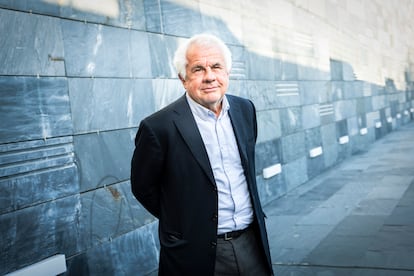Lant Pritchett, economist: ‘Negativity around migration is the last breath of a moribund system’
The expert on development and human mobility defends immigration as a tool for growth and as the only way Europeans will be able to maintain their lifestyle on a continent that is only getting older

Economist Lant Pritchett (Utah, 1959) calls himself an optimist due to age. “I’m an optimist because I’m 64 years old”, he says. “When I was born, Black people in the United States couldn’t vote in the South, they were segregated… Women also had a very limited role. But there’s been a radical change in terms of opportunities and civil rights. I’m an optimist because I’ve seen that kind of big positive changes”.
Following that reasoning, Pritchett is convinced that humanity is on the brink of a big, positive change when it comes to people who move across borders. This is not idle talk. Pritchett is one of the greatest experts in the world when it comes to human mobility. He has taught at Harvard and Oxford, among other universities, he has worked for over a decade at the World Bank and has published more than one hundred works exploring a wide range of topics, among them economic growth, education and development aid. During the last few years, he has turned to labor mobility “because its positive effects are radically underestimated”, he says. Currently, he is the cofounder and research director at Labor Mobility Partnerships (LaMP), an organization that looks to broaden understanding of possible legal pathways towards everyone winning: both countries of origin and destination.
Pritchett visited Madrid at the start of October to work with the Spanish government on a possible pilot collaboration with Colombia on training materials, and was welcomed by the then-minister of Inclusion, Social Security and Migration, José Luis Escrivá. The economist gave this interview after his talk during a recent session of the “Rome Dialogues on Jobs and Migration” series. Asked to speak on borders, immigration and human mobility, his first argument is compelling: “If there was no mobility, we would all still be in Africa. Most countries had almost no border restrictions until the 1920s. This century has been an anomaly, a brief span of human history in which the world has been divided by strictly controlled borders”, he says.
Question. In regards to the negative discourse surrounding migration, you defend it as an opportunity for development. But in many European countries, as well as the United States, migrants are criminalized both politically and socially. How do you see the current situation?
Answer. The negativity around migration is the last breath of a moribund system and the transition to a more realistic approach. There’s a famous quote by John Maynard Keynes, one of the best-known economists of all time. When they accused him of changing his opinion on a political issue, he said: “When the facts change, I change my mind”. Demographic changes are going to create such pressures on countries trying to maintain a lifestyle based solely on their nationality that they will have to open up to labor mobility.
Q. And how will that outlook change? If we look at borders in Europe and the United States, for example, if we take into account the tightening of migration control policies that the European Union is approving, it does not seem like we are going down that road.
A. A large part of the tension comes from the countries, governments and societies that have yet to make the connection between two key questions: Who is our future? And, who is going to be allowed to live and work in our territory to provide services, have a job and earn a salary? If you combine these two questions, you will inevitably create tensions and negative views towards migration. But if you separate them, you complete change the politics. People will say: “We need workers, and we’re going to allow those people to live here, respecting their rights and giving them the opportunity to work, but not necessarily an automatic and immediate path to citizenship”. When you separate those two questions in public dialogue, the negative attitudes disappear.
Q. In your presentation you said that the number of people older than 80 will double in the next 30 years and that of people in the workforce will greatly diminish. At the same time, we have 1.4 billion people in Africa, of which more than half are younger than 25, looking for work, and that number will have doubled by 2050. The math seems easy…
A. All you have to do is put together those two statistics. Now, what is making that connection difficult is the question: if I allow someone from Africa to come help me take care of my grandmother, am I obligated to give that person Spanish nationality? If the answer is the affirmative, fear and the feeling of losing something valuable of what it means to be Spanish arise, and that threat generates reactionary politics. But if you think that the person is going to work here for a few years and then return home with their earnings, invest in their country, and then someone else will come and all this will be a rotational process, you will radically increase the number of people willing to have foreigners in their country. And Spain will be better able to take care of its elderly. It’s a win-win.
Q. But not everyone who emigrates does so looking for work; of the 184 million migrants in the world there are more than 40 million refugees and asylum seekers who fled a country in war or a situation of violence or from the effects of climate change.
A. Governments should create three tracks for people who come to live in their country. One track is that of people who hope to become Spanish. Another is that of those who we are going to allow to live and work here; the third is that of those of we are going to allow to be in Spain out of necessity. They are very different, but a large part of the current tension is that we are letting the issue of refugees become the labor issue, or letting the issue of citizenship drive the labor issue. If you force the three tracks to be too similar, you generate tension and political backlash. Once separated, they will work well in all three directions.
Q. Expecting foreigners to become Spaniards may arouse misgivings due to nationalistic or patriotic concerns. It has to do with not losing our cultural identity, don’t you think?
A. Sometimes people think that defending the idea of what it means to be Spanish is racist or xenophobic, but that’s not the case. Valuing traditions, culture and history is simply a legitimate part of the human experience, and there is nothing wrong with preserving that. But that does not make it something finite; it is open to change because it is part of history, because we are a mixture of many different things.
Q. In recent years, the far-right political movement in Spain, but also in European countries as varied as Finland and Italy, have been gaining more and more support, or has even gained elected representation in the Government. Part of this comes from the fact that they are spreading racist and xenophobic discourse, and using migration as a political weapon.
A. The thing about the far-right parties is that they are trying to get people to equate all foreigners in a country with a threat to our future, but they are only gaining ground because of their ability to generate fear. Once immigration policy is clarified and these three channels —who is our future, who is allowed to work here, who we welcome out of necessity— are entered into the public debate, the narrative will change and the xenophobes will go back to the caves and slimy holes from which they came. Part of the response must be to make it clear that it is possible to regulate labor mobility in an orderly fashion and, in so doing, people will no longer see it as a threat to their future.
What will change radically in the future, in relationship to the past, is that for the last 100 years, it has been considered a key responsibility of Government to provide jobs for all its citizens, and given the overall population growth, that has always been a challenge. But once the demographics reverse, the challenge will be to find a person for every job. In the coming years, the impact of demographic changes is going to lead to chronic labor shortages.
Q. That will especially affect Spain, which with a birth rate of 1.23 births per woman, has the second lowest fertility rate in the European Union. How do you see our panorama?
A. In the absence of immigrants, between 2020 and 2050 Spain’s labor force (its active population) will drop from 22.6 to 15.7 million people. You’re not going to fill all the jobs needed in a modern and sophisticated economy like that of Spain’s with 15.7 million people. So, nobody is going to see their own opportunities threatened by people coming to work.
In fact, for Spaniards to have the job opportunities they want, they are going to need foreign people because, if you look at the production chain, you need a lot of people. You can’t do your job unless other people are doing theirs. When people talk about the future of work, it’s often as if they’re only talking about that of the upper-middle class. The future of work will continue to mean a lot of physical effort on someone’s part and that, in fact, doesn’t require high levels of formal education. According to my numbers, in the United States there will be a net of 3.24 million new low-skill jobs, but there will also be 4.7 million fewer people in the labor force. So, you’re not going to take a job away from an American to fill any of those 3.24 million jobs. I’m sure if we had Spain’s estimates they would be even worse, because the country’s fertility decline is going so much faster than in the U.S., and the demographic changes will be more dramatic. I think ensuring that all Spaniards have adequate opportunities will be easy.
Sign up for our weekly newsletter to get more English-language news coverage from EL PAÍS USA Edition
Tu suscripción se está usando en otro dispositivo
¿Quieres añadir otro usuario a tu suscripción?
Si continúas leyendo en este dispositivo, no se podrá leer en el otro.
FlechaTu suscripción se está usando en otro dispositivo y solo puedes acceder a EL PAÍS desde un dispositivo a la vez.
Si quieres compartir tu cuenta, cambia tu suscripción a la modalidad Premium, así podrás añadir otro usuario. Cada uno accederá con su propia cuenta de email, lo que os permitirá personalizar vuestra experiencia en EL PAÍS.
¿Tienes una suscripción de empresa? Accede aquí para contratar más cuentas.
En el caso de no saber quién está usando tu cuenta, te recomendamos cambiar tu contraseña aquí.
Si decides continuar compartiendo tu cuenta, este mensaje se mostrará en tu dispositivo y en el de la otra persona que está usando tu cuenta de forma indefinida, afectando a tu experiencia de lectura. Puedes consultar aquí los términos y condiciones de la suscripción digital.









































